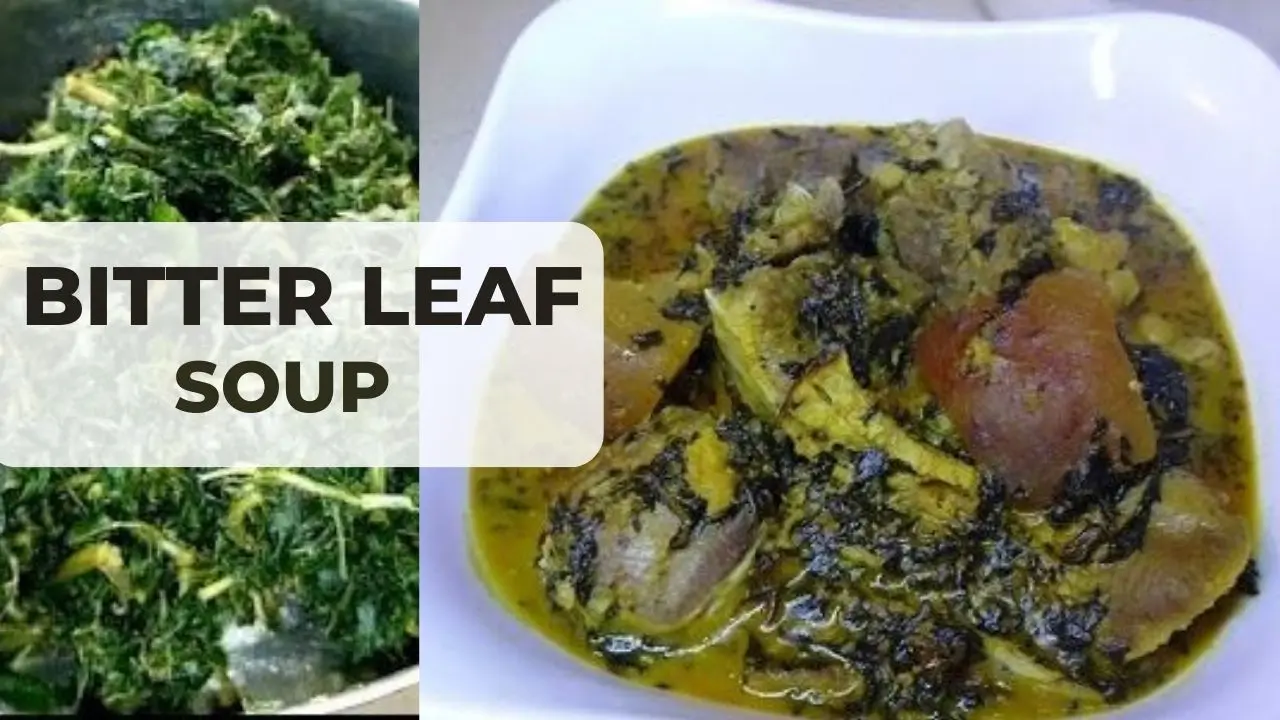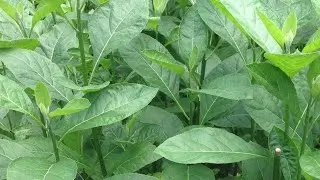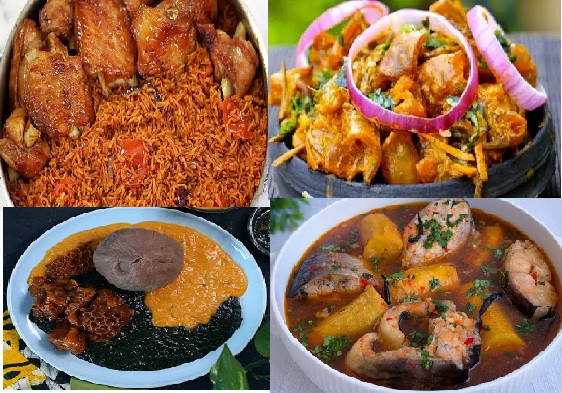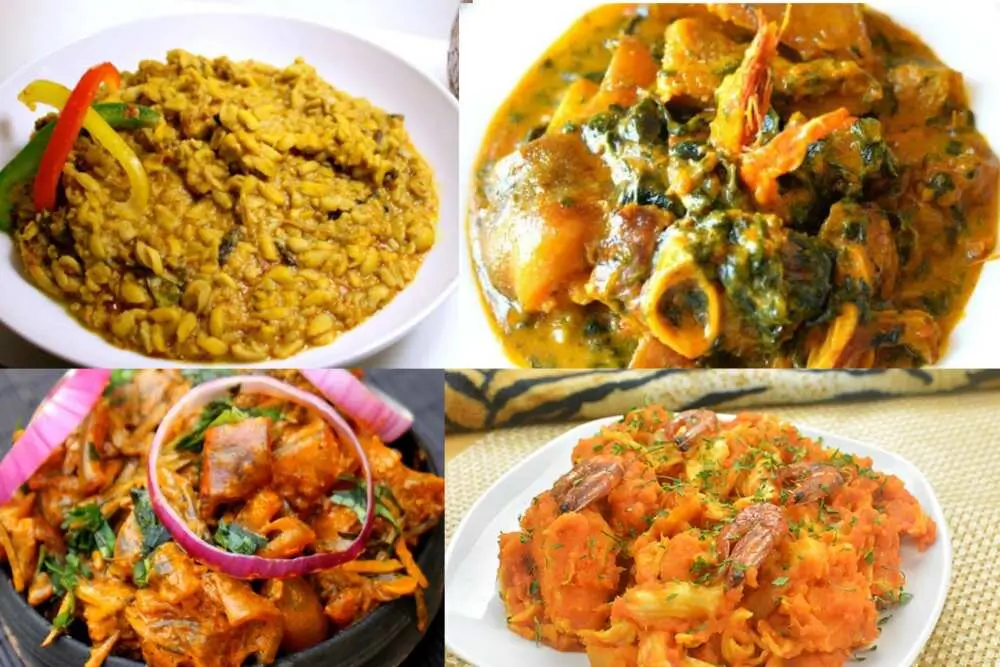
Bitter leaf soup, also known as Ofe Onugbu in Igbo, is a traditional Nigerian soup that is popular among the Igbo people of Eastern Nigeria. Ofe Onugbu is made using bitter leaves, which are the leaves of a plant called Vernonia amygdalina, and cocoyam paste, which is used to thicken the soup. Bitter leaf soup is usually cooked with assorted meat, fish, palm oil, crayfish, pepper, and a local seasoning called Ogiri Igbo.
Bitter leaf soup is one of the most popular soups among the Igbo people and it is often served at ceremonies, festivals, weddings, and other special occasions. It is also a common everyday meal that can be enjoyed by anyone who loves Nigerian food.
This article will tell you everything you need to know about Bitter Leaf soup, including its ingredients, origin, health benefits, how to cook, and how to enjoy this delicious meal. Read on to learn more about this fantastic Nigerian delicacy!
What Is Bitter Leaf Soup?
Bitter leaf soup is a type of Nigerian soup that is made with bitter leaves and cocoyam paste. Bitter leaves are the leaves of a Vernonia amygdalina plant, which belongs to the daisy family.
They have an intense bitter taste that can be reduced by washing or boiling them before use. Cocoyam paste is made from cocoyam corms, tuberous roots similar to taro or yam. Cocoyam paste is used as a thickener for the soup and gives it a smooth and creamy texture.
The Origin and History of Bitter Leaf Soup
Bitter leaf soup is a traditional Nigerian soup that originated with the Igbo people of Eastern Nigeria. The Igbo people are one of the largest ethnic groups in Nigeria, and they have a rich culture and history that date back to pre-colonial times. Bitter Leaf is also popular among the people of Congo and Cameroon.
The Igbo people have been cultivating bitter leaves for centuries as a medicinal plant and a vegetable crop. Bitter leaves treat various ailments such as malaria, fever, diabetes, diarrhea, worms, infections, inflammation, and pain. Bitter leaves can also be eaten raw, cooked as a vegetable dish, or added to soups and stews.
Bitter leaf soup is a symbol of the Igbo culture and identity, and it reflects their resilience and adaptability. Despite the bitter taste of the leaves, the Igbo people have learned to wash and cook them in a way that makes them delicious and nutritious. Bitter leaf soup also showcases the diversity and richness of Igbo cuisine, which uses various ingredients and seasonings to create different flavors and textures.
Bitter leaf soup is not only a dish but also a heritage that has been passed down from generation to generation. It is a part of Igbo history and tradition that has been preserved over the years.
What is Bitter Leaf Soup Made of?
The main ingredients used in cooking Onugbu soup are:
Washed and squeezed bitter leaf
Cooked and blended cocoyam
Assorted meat or Fish
Palm oil
Crayfish
Pepper.
Additionally, Ogiri Igbo, a fermented seasoning made from castor oil seeds wrapped in banana leaves and left to ferment for several days, is added to give the Soup a distinctive flavor and aroma typical of Igbo cuisine.
Ogiri Igbo is rich in protein and can be replaced with Iru (locust beans) or Dawa Dawa (African locust beans).
The Health Benefits of Eating Bitter Leaf Soup
Bitter leaf soup is not just tasty but also healthy, having many health benefits that can improve well-being and prevent diseases. Some of the health benefits of Bitter Leaf soup are:
- Bitter leaves contain potassium, which helps regulate blood pressure. They also have anti-hypertensive properties that can relax the blood vessels and improve blood circulation.
- The Soup contains fiber, which slows down glucose absorption and prevents spikes in blood sugar levels.
- Bitter Leaves are rich in vitamin C, an antioxidant that can strengthen the immune system and fight off infections. They also have antibacterial, antifungal, antiviral, and anti-parasitic properties that can kill harmful microorganisms and protect the body from diseases.
- Bitter Leaf Soup stimulates the production of bile and digestive enzymes that can aid in the breakdown and absorption of food. They also have laxative effects that can relieve constipation and promote bowel movements.
- Bitter leaves can detoxify the body. They have diuretic effects that can increase urine output and flush out toxins from the body. They also have liver-protective effects that can prevent liver damage and enhance liver function.
How to Prepare Bitter Leaf Soup
Making bitter leaf soup is not difficult, but it requires some time and patience. The main steps involved in making bitter leaf soup are:
- Wash and squeeze bitter leaves thoroughly to make it tender and soft. Parboil and rinse leaves to reduce bitterness; you can wash it with salt to reduce the bitterness. Wash it over and over again, continue tasting it till you you’re satisfied with the level of bitterness.
- Season and cook the meats and fish until they are tender. Soak smoked fish in a water to remove sand and other particles. Soak the stock fish in hot or warm water to make it tender.
- Put the Palm Oil in a pot and cook the palm oil, crayfish and peppers to add flavour.
- Add the Bitter Leaves and onions and allow to cook for some time.
- Pour in the seasoned meats and fish. Allow the Bitter Leaves and Meats to cook for about 10-15 minutes
- Season with salt and Seasoning cubes (Maggi).
- Allow the food to cook for some time and allow to cool before serving.
- Serve the Bitter Leaf Soup with swallow like eba or fufu and enjoy your meal.
Which Tribe Eats Bitter Leaf Soup?
Many ethnic groups in Nigeria eat Bitter Leaf soup, but it is very popular among the Igbo, Yoruba, Efik, and Ibibio tribes of Cross River and Akwa-Ibom State. The Igbo tribe of southeastern Nigeria is most closely associated with this soup.
How to Reduce The Bitterness of Bitter Leaf
Some ways to reduce the bitterness of bitter leaf include:
- Pound the Bitter leaves, then boil them, then wash them.
- Squeezing out the boiled leaves to remove some bitterness
- Boil the Bitter, leave it again with Salt, and then rinse and squeeze.
Another Name for Bitter Leaf in Nigeria
Other names for Bitter Beaf in Nigeria include:
Ongbu (Igbo)
Ewuro (Yoruba)
Etidot (Cross River State)
Ima (Igala)
Oriwo (Edo)
Chusar doki (Hausa)
Ityuna (Tiv)
Yoruba Name of Bitter Leaf?
The Yoruba name for bitter leaf is ‘ewuro’.
Can a Pregnant Woman Eat Bitter Leaf Soup
Yes, pregnant women can eat bitter-leaf soup in moderation. However, excessive consumption is not recommended, as Bitter Leaves may stimulate uterine contractions.
It’s best to limit intake and consult a doctor about how much to consume safely during pregnancy.
You should avoid eating bitter-leaf soup if you have any underlying health conditions, such as high blood pressure or diabetes. It is also important to cook bitter-leaf soup thoroughly before eating it. This will help reduce the risk of food poisoning.
If you have any concerns about eating bitter-leaf soup during pregnancy, please talk to your doctor.
Which Tribe Eats Bitter Leaf Soup?
Bitter leaf soup is widely consumed by various Nigerian tribes, including the Igbo, Yoruba, Efik, Ibibio, Edo, and Hausa tribes. However, it’s most strongly associated with Igbo cuisine.
Who Discovered Bitter Leaf Soup
There needs to be concrete information on who discovered Bitter Leaf Soup, as its origins trace back many centuries in West Africa and Nigeria. The knowledge and recipes were passed down through generations before being popularized throughout southern Nigeria.
Who Invented Bitter Leaf Soup
No one person invented most traditional soups, such as bitter leaf soup, but instead, they evolved through a communal sharing of recipes and ingredients. Its origins can be traced to several ethnic groups, like the Igbos, who started using Bitter Leaf Soup in their Soup and cooking.
Conclusion
Bitter Leaf soup is truly a Nigerian culinary treasure. This nutritious Soup has origins tracing back centuries to the Igbo people, for which it remains a cultural pride. From its unique bitter taste to its impressive health benefits, it’s easy to see why bitter leaf soup continues to be cherished in many Nigerian households today.
While the initial bitterness may be startling, proper preparation of the leaves, seasoning with spices, and cooking can make the food tasteful and very pleasant to your taste buds. You can also choose to add other vegetables to make it more appealing and delicious.
Whether you want to be in the company of family and friends or alone, Bitter Leaf Soup is one delicious Soup you’d like to savor. Bitter Leaf Soup is one of the top 10 Nigeria’s Most Famous Foods. Try some Bitter Leaf Soup today!





